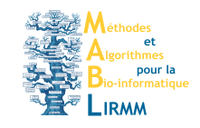
MAB Team
Methods and Algorithms for Bioinformatics

The MAB team (Methods and Algorithms for Bioinformatics) proposes mathematical and algorithmic methods (text and tree algorithms, combinatorial algorithms and optimization, probabilistic modeling, statistical machine learning) to address biological issues such as evolution, phylogeny, comparative genomics, functional annotation of genes and proteins, malaria, HIV, cancer. The software systems developed by MAB are available through the ATGC platform.
Staff
Fabio Pardi, Chargé de recherche, CNRS
Krister Swenson, Chargé de recherche, CNRS
Kevin Yauy, Maître de conférences, UM
Alban Mancheron, Maître de conférences, UM
Sylvain Milanesi, Ingénieur d’étude, CNRS
Vincent Berry, Professeur des universités, UM
Anne-Muriel Arigon, Maître de conférences, UM
Eric Rivals, Directeur de recherche, CNRS
Stéphane Guindon, Chargé de recherche, CNRS
Annie Chateau, Professeur des universités, UM
Laurent Brehelin, Chargé de recherche, CNRS
Associates and Students
Julien Raynal, CNRS
Elliot Butz, CNRS
Victoire De Viry, UM
Regular Co-workers
Christophe Menichelli, CDD Ingénieur-Technicien, CNRS
Mathilde Robin, Invité longue durée Mission longue, ICM
Jordan Moutet, ATER, UM
Amelie Ngo, Doctorant externe, CNRS
Chiria Jorotiana, Doctorant externe, Université de Fianarantsoa
Tristan Dubos, CDD Ingénieur-Technicien, CNRS
Christophe Vroland, CDD Chercheur, CNRS
Collaborators :
Olivier Gascuel (MNHN, Paris)
Charles Lecellier (IGMM, Montpellier)
Sophie Lèbre (IMAG, Montpellier)
In all our work we aim at developing sound theoretical results for solving important biological questions. Our activities are organized in three main fields:
- Text Algorithms and Methods for High Throughput Sequencing Analysis
- Methods for understanding evolution
- Tools for functional annotation
The software developed in the team is available on the ATGC platform.
The ATGC platform, labelled by IBiSA in 2010, is supported by the following Investissement d’Avenir projects: IFB (Institut Français de Bioinformatique), France Génomique and Labex NUMEV. The platform is supported by the MAB (Methods and Algorithms for Bioinformatics) research team and also benefits from the research carried out within the IBC (Institute of Computational Biology).
The platform has the triple vocation of disseminating the bioinformatics tools developed within the Montpellier community, of encouraging collaborations between computer scientists and biologists, and of providing assistance to these researchers by setting up bioinformatics services directly related to their work.
The tools it offers are accessible online free of charge. They can be downloaded and/or run on the LIRMM clusters. This activity therefore targets the regional, national and international community. The tools distributed on ATGC have a very high international visibility. For example, the PhyML software (developed within the MAB team, and classified as “Current Classic” since October 2007 by Science Watch) has been cited more than 15,000 times (see Web of Science).
A major axis of the platform concerns evolutionary studies. We are developing phylogenetic reconstruction algorithms (e.g. PhyML) and tree analysis and visualisation tools. This work is implemented in software that we distribute through the platform. These can be downloaded and/or run online. An effort to integrate these tools has been made (in collaboration with the Marseille bioinformatics platform) in order to make them accessible within a particularly user-friendly online phylogenetic analysis pipeline (http://www.phylogeny.fr: 300 analyses per day).
Another axis concerns the processing of data from high-throughput sequencing. We are developing algorithms for rapid processing of this data, to identify transcripts and place them on the genome. For example, we have developed the LorDEC software, which is the first to propose the correction of sequencing errors from the latest generation of sequencers. This project is taking place in a very favourable regional context in collaboration with the Montpellier Genomix platform.
MAB seminars are centered on math-info-bio themes. The subjects presented address methodological issues and their applications in biology. Seminars take place at LIRMM – Building 5 (860, rue de St Priest, 34095 Montpellier).
Ongoing projects – carried or in which the team is involved :
- MUSE BAPTISM Project on alignment-free phylogenetic identification of eDNA (2018-2019);
- Région Occitanie COALAB Project on approximation algorithms for bioinformatics (2018-2019),
- CNRS Project “Osez l’interdisciplinarité!” (2017-2018);
- Inter-LABEX Project (NUMEV-CEMEB-AGRO) ORTHOLOGAP on homology/orthology (2018-2019);
- LABEX NUMEV Project on the bioinformatics platform phylogenomics.fr (2018-2019);
- LABEX NUMEV Project on graphical representation of molecular evolution processes (2017-2019);
- Laboratoire International Associé (LIA) with IGMM and the University of Vancouver : Regulation of microRNA genes (miREGEN) (2017-2021);
- ANR Genospace Project on the analysis of geo-referenced genetic sequences(2016-2019);
- IFB Project 3GENSEQ (2016-2018);
- IFB Project NGPhylogeny.fr (2016-2018);
- Étendard NUMEV Project : « Information fuelled biophysical models for the control of gene expression » (2016-2019);
- Projet Plan Cancer LIONS sur la régulation de la transcription dans le cancer de la vessie (2016-2019);
- Projet GenomeHarvest de la Fondation Agropolis sur l’organisation des génomes de plantes (2016-2019);
- IFB Projects on Evolutionary Bioinformatics (2015-2018);
- H2020 Project VIROGENESIS on viral metagenomics(2015-2018);
- PIA Projec with the Institut de Biologie Computationnelle (Investissement d’Avenir, Bioinformatics call, accepted in 2012);
- PIA Project with the Institut Français de Bioinformatique (Investissement d’Avenir, Biology-Health Infrastructure call, accepted in 2012). Leader of the Evolutionary Bioinformatics axis;
- PIA Project France Génomique (Investissement d’Avenir, call Infrastructure in Biology-Health, accepted in 2011). RNAseq workpackage leader;
- PIA Project Labex NUMEV (Investissement d’Avenir, accepted in 2011). Leader of the Algorithms and Calculations axis.
Past Projects:
- FRM Project on the regulation of translation(2014-2017);
- NUMEV AC-DC Project on modeling orthology relationships (2016-2017);
- PEPS Project “Understanding Emerging Diseases and Epidemics: Modelling, Evolution, History and Society”: Evolutionary mechanisms and conservation of the HIV-1 antisense protein (ASP) (2013-2016);
- NUMEV Project: Collaborative web portal for visualisation and comparison of phylogenies (2015-2016);
- NUMEV Project :Identification of motifs involved in microRNA regulation (2015-2016);
- ANR Project Colib’read on NGS data (2013-2016);
- PlasmoExpress ‘’Bioinformatic methods for the analysis of transcriptional regulation in Plasmodium falciparum’’ (2011-2013);
- ATCG “Acceleration of Comparative Genomic Data Processing” (2010-2013);
- “Chercheur d’Avenir” Project, Région Languedoc Roussillon (2010-2013).
- “Défis computationnels des séquençage et phénotypage haut-débit en science de la vie“ Project, MASTODONS call (2012 – 2015).
- PEPS CNRS/UM2/UM1 “Understanding emerging diseases and epidemics: modelling, evolution, history and society“.
- Phylospace (ANR Project)
Teaching at the University of Montpellier
The team is involved in various teaching courses at the University of Montpellier (Faculty of Sciences and Polytech), at different levels for different audiences, and in particular in the Master’s programme:
- Master in Computer Science – Faculty of Science: students with a Bachelor’s degree in Computer Science;
- Master Mathematics, Biostatistics course – Faculty of Science: students with a Bachelor’s degree in Mathematics
The members of the team are responsible for several teaching units in computer science (Bachelor’s and Master’s degrees) and in bioinformatics (Master’s degree). Some of them, strongly linked to our research themes, involve several researchers and teacher-researchers of the team:
- Algorithms and optimisation for advanced bioinformatics (M2 BCD, M2 Computer Science)
- Biological sequence analysis (M2 Biostat)
Continuing education and thematic schools:
- Continuing education CNRS Molecular Phylogeny (1 time per year)
- Continuing education CNRS Bioinformatics for sequencing data processing (NGS) (once a year)
Past training courses:
- Organisation of the “Galaxy4Bioinformatics” training in Montauban in November 2015 (NUMEV funding);
- International Bioinformatics School Tunis, Sep. 2014 organised by Institut Pasteur and the European Molecular Biology Organisation;
- Spring School of Theoretical Informatics, ile d’Oléron, May 2014;
- Next Generation Sequencing, Bioinformatics Spring School from NOVA network (The Nordic Forestry, Veterinary and Agricultural University Network) march 2012, Enaforsholm Sweden
We are involved in the editorial boards of 6 international journals, numerous algorithmic and bioinformatics conferences. In addition, we have responsibilities in scientific bodies such as the “Molecular Bioinformatics” GdR and the national platform networks (France Génomique and the French Institute of Bioinformatics IFB). At the local level, in addition to teaching responsibilities, we are responsible for the Institute of Computational Biology, and involved in the scientific departmental councils of the University or the ATGC Bioinformatics Platform.
Editorial boads
- Systematic Biology (associate editor);
- BMC Bioinformatics;
- BMC Evolutionary Biology;
- Algorithms for Molecular Biology;
- Evolutionary Bioinformatics;
- Dataset Papers in Biology.
International Conference Selection Committees
- 24th International Symposium on String Processing and Information Retrieval SPIRE 2017;
- 28th Annual Symposium on Combinatorial Pattern Matching, CPM 2017;
- NGS Conference – Structural variation and population genomics 2017;
- ECCB European Conference on Computational Biology: 2012, 2014, 2016;
- RECOMB-SEQ RECOMB Satellite Workshop on Massively Parallel Sequencing: 2016;
- NGS Conference – Genome Annotation: 2016;
- IEEE BIBM International Conference on Bioinformatics and Biomedicine: 2015-2016;
- WABI (Workshop on Algorithms in Bioinformatics) 2012-2017;
- RECOMB-CG (RECOMB Satellite Workshop on Comparative Genomics) 2010-2017;
- ISMB (International Conference on Intelligent Systems for Molecular Biology) 2015-2016;
- ACM-BCB (ACM Conference on Bioinformatics, Computational Biology and Biomedical Informatics) 2016,2013;
- APBC (Asian Pacific Biocomputing Conference) 2016-2015;
- 27th Annual Workshop on Mathematical and Statistical Aspects of Molecular Biology, MASAMB 2017;
National or international responsibilities
- Director of the “Molecular Bioinformatics” GdR 2010-2015;
- President and member of the CoNRS Interdisciplinary Commission: Modelling of biological systems, bioinformatics;
- Member of the Scientific Council of the Institute of Information Sciences and their Interactions (CSI INS2I);
- Member of the Management Committee of the COST Action “SeqAhead” (2011-2015) (full name: Next Generation Sequencing Data Analysis Network), on Bioinformatics for High-Throughput Sequencing, and responsible for the Young Investigators Stays (STSM);
- Member of the Society of Systematic Biology;
- Co-leader of WorkPackage in the France Genomics network since 2012;
- Member of the Executive Board and founding platform of the French Institute of Bioinformatics (IFB) since its creation;
Regional responsibilities and involvement
- Management of the Institute of Computational Biology 2012-2017;
- Director of the ATGC Bioinformatics Platform since 2001;
- Council of the Scientific Department MIPS, University of Montpellier;
- Labex Numev, committee member and co-leader of the Integrated Project “DNA and Genomes” since its creation;
- Responsible for the training courses “Bioinformatics for NGS”, “Phylogeny” and “Linux and scripting for bioinformatics”;
- Head and co-leader of the LIRMM Computer Science Department 2007-2010 and 2012-2014;
- Member of the LIRMM Scientific Council from 2012 to 2014;
- Member of the LIRMM Laboratory Council since 2015.
Responsibilities in teaching
- Deputy Director of the Computer Science teaching department of the Faculty of Science of the University of Montpellier since 2015;;
- Director of the Transversal Computer Science Department at Polytech from 2010 to 2015;
- Head of the Bioinformatics, Knowledge and Data (BCD) course of the Master Sciences & Numerics for Health (SNS) from 2012 to 2016;
- Head of the Computing for Science course of the Master in Computer Science from 2011 to 2015;
- Head of the digital unit at Polytech since 2015.
Organisation of congresses and conferences
- Mathematical and Computational Evolutionary Biology 2012-2017;
- Colib’read Workshop, 7-8 November 2016 in Paris;
- France Génomique Workshop WetLab and Bioinformatics in Montpellier, 9-10th May 2016;
- International Workshop “Data Structures in Bioinformatics” Bielefeld, Germany, February 23-24, 2016;
- Colloque de Bioinformatique du GdR BIM, Paris, 2013 & 2015;
- First international Workshop “Data Structures in Bioinformatics” Montpellier 8-9 Dec. 2014;
- Colloquium “Indexing for scientific big data”, Paris 15th Jan 2014;
- International Workshop VARIAHTON 2013 Udine Italy, 21 May 2013;
- Workshop SeqBio, Montpellier, 2013 & 2014
- January, 30th, 2019, 14:00 AM (Room BAT5 02/022)
Vincent Berry “Balade en pays phylogénétique 2” - December, 18th, 2018, 14:00 AM (Room BAT5 02/022)
Vincent Berry “Balade en pays phylogénétique 1” - November, 15th, 2018, 14:00 AM (Room BAT5 02/022)
Krister Swenson “An overview of a some projects on phylogenetic tree analysis and genome comparison” - June, 22th, 2018, 10:00 AM (Room BAT5 02/022)
Marc Chakiachvili, “Why and how to choose your IDE (integrated development environment)” - June 14th, 2018, 13:30 AM (Room BAT5 02/022)
Eric Rivals, “Hierarchical Overlap Graph” - Avril, 28th, 2018, 10:00 AM (Room BAT5 02/022)
Sylvain Pulicani, ” Should we mine for Bitcoin in MAB ?” - March, 30th, 2018, 10:00 AM (Room BAT5 01/156)
François Chevenet, “Phylogenies et Annotations : à la recherche de scenarios évolutifs. L’éditeur PAELA” - February, 27th, 2018, 13:30 PM (Room BAT5 01/156)
Laurent Bréhélin, “Domaines de régulation vs. motifs de régulation.” - February, 15th, 2018, 10:00 AM (Room BAT5 02/022)
Denis Bourget, “Peer Community in : un système de recommandation public et gratuit de preprints” - January, 25th, 2018, 10:00 AM (Room BAT5 01/156)
Stéphane Guindon - December, 14th, 2017, 10:00 AM (Room BAT5 0/156)
Alban Mancheron, “Comparaison de pipelines d’analyse de variants génomiques” - November, 30th, 2017, 10:00 AM (Room BAT5 02/156)
Marie-Cécile Robert, “Presentation of the CRISPR/CAs9 system” - October, 12th, 2017, 10:00 AM (Room BAT5 01/156)
Eric Rivals, “Presentation of the LIRMM survival toolkit” - June, 22th, 2017, 10:00 AM (Room BAT5 2/022)
Marc Chakiachvili, “Why and how to choose your IDE (integrated development environment)” - May, 18th, 2017, 10:00 AM (Room BAT5 1/056 )
Emma Saulnier, “Zombie apocalypse and epidemiological modeling” - April, 20th, 2017, 10:00 AM (Room: BAT5 01/124)
Krister Swenson, “Gluing computation experiments together with Snakemake” - March, 16th, 2017, 10:00 AM (Room: BAT5 02/022)
Rodrigo-antonio Canovas-barroso, “Debate about Compressed Structures” - February, 16th, 2016, 10:00 AM (Room: BAT5 02/022)
Clément Agret, “MARIANA: the cutest deep learning framework” - December, 8th, 2016, 10:00 AM (Room: BAT5 02/022)
Laurent bréhélin, “Cell biology by the numbers” - November, 24th, 2016, 10:00 AM (Room: BAT5 01/124)
Fabio Pardi, “SIMONS human diversity project” - October, 20th, 2016, 10:00 AM (Room: BAT5 02/022)
Benjamin Linard, “Science and social networking”
Title: Nouvelles méthodes de gestion, danalyse et de comparaison de larges collections de génomes appliquées à des approches pangénomiques
PhD defendant: Nastasija Mijovic
Defense date: 2025-12-16
Thesis director:
Annie Chateau
Title: Traitement des insertions et délétions de séquences en bioinformatique pour la reconstruction des séquences ancestrales.
PhD defendant: Jordan Moutet
Defense date: 2025-12-15
Thesis director:
Eric Rivals
Title: Des chevauchements entre mots
PhD defendant: Pengfei Wang
Defense date: 2024-12-13
Thesis director:
Eric Rivals
Title: Calcul de k-mers informatifs pour le placement phylogénétique
PhD defendant: Nikolai Romashchenko
Defense date: 2021-12-14
Thesis director:
Eric Rivals
Title: Étude de l’impact des répétitions d’ADN sur la dynamique des génomes : Vers un focus sur les génomes de moustiques
PhD defendant: Yasmine Mansour
Defense date: 2021-12-10
Thesis director:
Annie Chateau
Title: Élaboration d’une méthode d’identification et de quantification de spécimens en mélange.
PhD defendant: Quentin Delorme
Defense date: 2021-11-22
Thesis director:
Annie Chateau
Title: A la recherche de léchafaudage parfait : efficace, de qualité, et garanti
PhD defendant: Tom Davot
Defense date: 2020-10-05
Thesis directors:
Rodolphe Giroudeau,
Annie Chateau
Title: scénarios évolutifs pondérés de réarrangements génomiques
PhD defendant: Pijus Simonaitis
Defense date: 2020-07-10
Thesis director:
Annie Chateau
Title: Méthodes pour la découverte de nouveaux domaines dans les séquences biologiques : application à Plasmodium falciparum
PhD defendant: Christophe Menichelli
Defense date: 2019-11-26
Thesis director:
Olivier Gascuel
Title: Etude de la relation entre les réarrangements chromosomiques et la structure 3D de la chromatine chez la Drosophile
PhD defendant: Sylvain Pulicani
Defense date: 2018-11-28
Thesis director:
Eric Rivals








